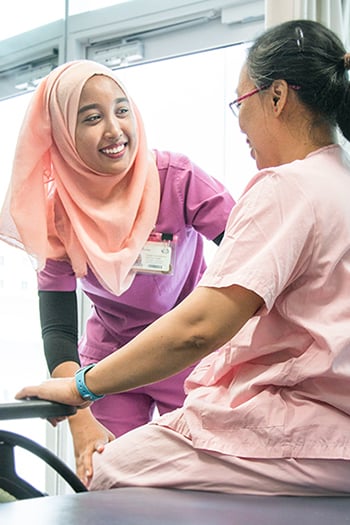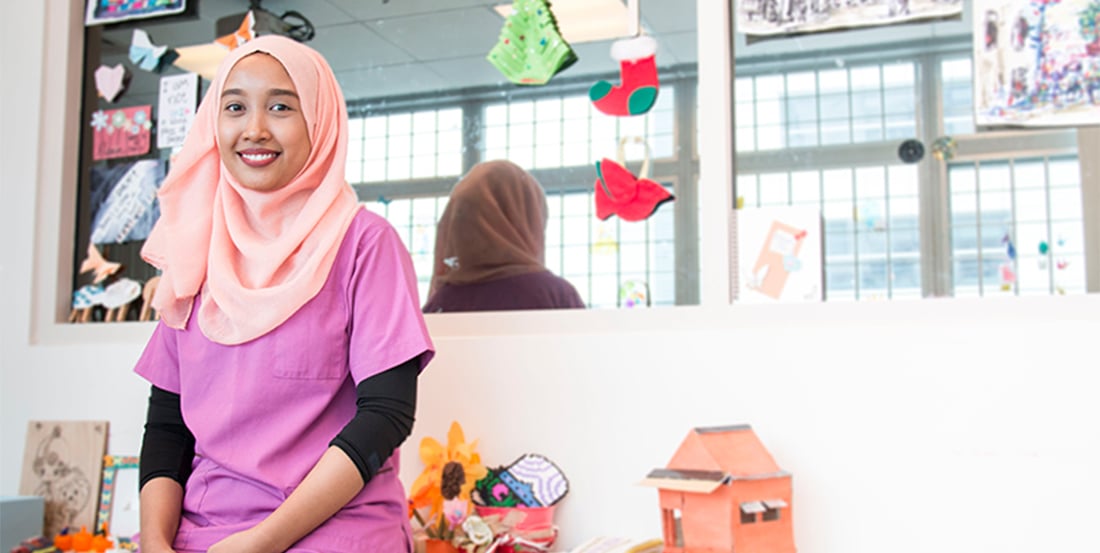Presently working in Changi General Hospital (CGH) as an Occupational Therapist, better known as an OT, Sharifah Shahidah partners with her patients who have suffered from physical or mental distress as they walk the road of recovery.
She assesses her patients' ability to perform their activities of daily living (ADL) independently and safely and plans interventions that are tailored to their needs. This may include coming up with cognitive rehabilitation plans for them or guiding them with assistive devices. In fact, her role also sees her go beyond the parameters of the hospital to assess the safety of patients' homes and ensure all hazards within them are rectified or minimised.
Today, Sharifah highlights some misconceptions people have about occupational therapy and shares about the qualities one needs in order to serve fruitfully as an OT.
What sparked your interest in healthcare, and in particular occupational therapy?
Sharifah Shahidah: The medical dramas and talk shows I watched as a child inspired me to work in the healthcare sector to help people. A TV show that featured an Occupational Therapist (OT) using unconventional methods such as horse-riding and swimming to treat patients sparked my interest and I reached out to people who were studying OT. This was not an easy decision during that time, as there were no local universities that offered OT.
What are some misconceptions surrounding occupational therapy?
Sharifah: In Singapore, the term 'occupational therapy' is not as widely known as in countries like Australia and the UK. Due to the name of our profession, some will mistake us as people who help others find jobs! They also think of us as people who merely prepare activities for ward patients when they see us doing cognitive retraining such as facilitating memory games.
There are some who assume we work in the pharmacy when we give recommendations about which wheelchair is most suitable for them or where to place grab bars in their homes. People also mistake us as being the same as physiotherapists. With the increasing demand of allied health professionals, hopefully more light will be shed into what each profession has to offer.
What are some challenges as an OT?
Sharifah: The most challenging aspect of our job is communicating with demanding families and caregivers of patients. Caregivers face immense pressure especially when their loved ones require more assistance with their daily activities. I lend a listening ear to caregivers so that they can vent their frustrations and are more receptive to our help. Other challenges would be stress and fatigue, but this can be easily overcome by talking to my colleagues or family, and engaging in my hobbies. Stress at work is inevitable after all.

Sharifah Shahidah Binte Syed Omar Aljuffri
Healthcare Scholar
Occupational Therapist
Share with us about a couple of meaningful episodes at work.
Sharifah: One of my elderly patients came in with a pneumonia episode and a few other medical issues which required a stay in the Intensive Care Unit (ICU). I remembered him from the time he was bed-bound due to his acute medical conditions. Together with the multi-disciplinary team, we worked together to help him get back on his feet. I was part of his recovery journey and he is now living at home with a maid, engaging in his activities again and walking with a mobility aid.
I've also had to play advocate for a few of my older patients who are afraid to speak out to the doctors when they have issues. We spend more time with the patients compared to the doctors, so it is natural for patients to build better rapport with us and entrust us with their problems.
What are some vital qualities an Occupational Therapist should possess?
Sharifah: I think the most important qualities are empathy and passion for serving others. The job of a healthcare professional is not easy, and you will get burnt out if you lack the passion to help others.
Being non-judgmental is also vital in our line of work. You will meet patients from all walks of life, and you have to remain open-minded when communicating with and treating them. Being clouded by judgment may prevent us from seeing the bigger picture.
What advice would you have for those who are exploring their scholarship options?
Sharifah: Keep an open mind! Do your research, talk to people, take up job shadowing opportunities and attend open houses to find out more about each profession before making a decision. Don't be daunted by the bond that comes with the scholarship. Regard it as job security, because getting a scholarship opens many windows of opportunities for you.

